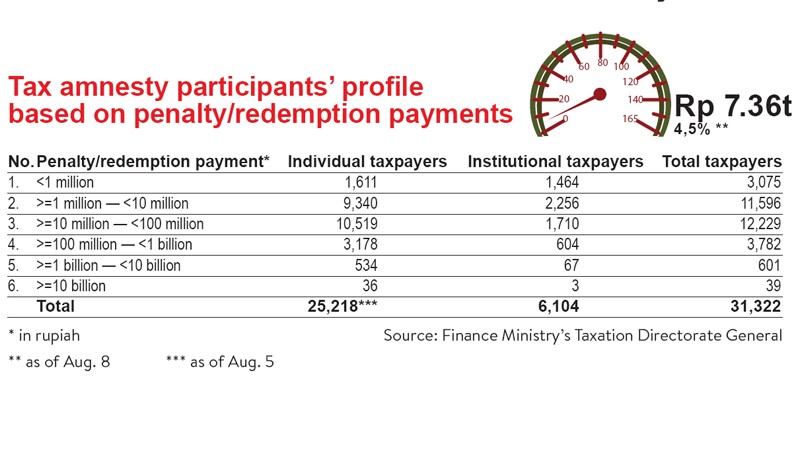Tax amnesty chokes budget
Change Size
 President Joko "Jokowi" Widodo talks about tax amnesty on July 21 in Jakarta. (Antara Photo/Irsan Mulyadi)
President Joko "Jokowi" Widodo talks about tax amnesty on July 21 in Jakarta. (Antara Photo/Irsan Mulyadi)
A
s the end of the first phase of the tax amnesty approaches, with little so far to show from the much-vaunted policy, the noose has begun to tighten around the state budget.
On Sept. 30, the first and most critical phase of the amnesty will conclude and the results will determine the program’s course until it officially winds up in March 2017.
The figures are not encouraging. As of Thursday evening, the program had only managed to persuade taxpayers to declare Rp 325 trillion (US$25 billion) in assets and repatriate Rp 15.7 trillion of this from overseas.
This is a far cry from what the government had envisioned with a whopping declaration target of Rp 4 quadrillion and Rp 1 quadrillion being repatriated.
At the same time, the size of penalty or redemption payments is pitifully small with a mere 4.5 percent of the Rp 165 trillion target achieved so far. The government had pinned high hopes on the penalties to help plug this year’s state budget deficit, which will stem from a taxation revenue shortfall estimated to be Rp 219 trillion.
As if to rub salt into the government’s wounds, Bank Indonesia (BI) has slashed its penalty forecast to only Rp 18 trillion this year with an additional Rp 3 trillion in the first three months of 2017, bringing the total sum to Rp 21 trillion. The central bank’s original penalty forecast was Rp 53.4 trillion.

And that is not all that BI has revised. In a working meeting on the 2017 state budget at the House of Representatives on Wednesday, BI Governor Agus Martowardojo told members of Commission XI—which oversees finance—that the program was expected to garner less than a fifth of the expected repatriated funds.
Agus, however, tried to be upbeat after the meeting. “That [the repatriated funds figure] is a base-line model and is a conservative figure based on what has been achieved so far,” he told reporters after the meeting, which was also attended by Finance Minister Sri Mulyani Indrawati.
The minister herself once told lawmakers that this year’s fiscal journey resembled a turbulent flight, through which the government was trying to land safely.
She said the country’s economy, which the government predicts will expand by between 5 and 5.1 percent this year from 4.8 percent last year, was comparable to the plane itself, while the people, whose purchasing power has been deteriorating for some time, were the passengers.
The former World Bank managing director had convinced President Joko “Jokowi” Widodo that a second round of budget cuts of Rp 147.6 trillion was necessary to cope with this year’s taxation shortfall.
Meanwhile, now that the government seems to have used up its austerity measure options and the tax amnesty has not yielded the desired silver bullet, economists say that increased borrowing to finance the budget may be the only way out.
Center for Reform in Economics (Core) Indonesia research director Mohammad Faisal predicts that the state budget deficit will inch closer to the legal limit of 3 percent of the gross domestic product (GDP) rather than the target of 2.5 percent.
“The list of options open to the government is getting shorter. There is no alternative to increased borrowing, a third round of budget cuts would be too painful for the economy and local administrations to bear,” he said.
Institute for Development and Finance (Indef) executive director Enny Sri Hartati and Bank Mandiri senior economist Andry Asmoro concurred with Faisal. “There’s still room to widen the deficit, let’s say, to 2.7 percent,” Andry said in a telephone interview.
As of Aug. 5, the budget deficit stood at 2.08 percent of GDP.
______________________________________
To receive comprehensive and earlier access to The Jakarta Post print edition, please subscribe to our epaper through iOS' iTunes, Android's Google Play, Blackberry World or Microsoft's Windows Store. Subscription includes free daily editions of The Nation, The Star Malaysia, the Philippine Daily Inquirer and Asia News.
For print subscription, please contact our call center at (+6221) 5360014 or subscription@thejakartapost.com









